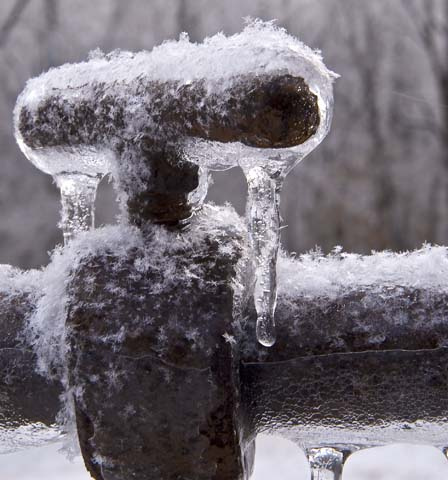Ways to Defend Plumbing System from Freezing: Key Advice
Ways to Defend Plumbing System from Freezing: Key Advice
Blog Article
The writer is making a few good observations on the subject of How To Avoid Freezing Pipes in general in this content beneath.

Cold weather can wreak havoc on your plumbing, particularly by freezing pipelines. Here's just how to prevent it from taking place and what to do if it does.
Introduction
As temperature levels drop, the danger of frozen pipes increases, potentially bring about expensive repairs and water damages. Comprehending just how to stop frozen pipelines is crucial for house owners in cold environments.
Avoidance Tips
Protecting susceptible pipes
Wrap pipelines in insulation sleeves or make use of heat tape to protect them from freezing temperatures. Concentrate on pipes in unheated or exterior locations of the home.
Home heating strategies
Keep interior rooms sufficiently heated, especially areas with plumbing. Open up closet doors to allow warm air to distribute around pipelines under sinks.
Just how to recognize icy pipes
Search for lowered water flow from faucets, uncommon smells or noises from pipelines, and noticeable frost on revealed pipelines.
Long-Term Solutions
Architectural modifications
Consider rerouting pipelines away from outside walls or unheated areas. Add extra insulation to attics, cellars, and crawl spaces.
Updating insulation
Purchase high-quality insulation for pipes, attic rooms, and wall surfaces. Appropriate insulation helps maintain constant temperature levels and decreases the risk of icy pipes.
Protecting Exterior Pipes
Garden hoses and outdoor faucets
Separate and drain pipes garden hoses prior to winter season. Set up frost-proof faucets or cover exterior taps with shielded caps.
Comprehending Icy Pipelines
What causes pipes to freeze?
Pipelines ice up when exposed to temperature levels listed below 32 ° F (0 ° C) for expanded periods. As water inside the pipelines freezes, it broadens, putting pressure on the pipe walls and possibly creating them to rupture.
Risks and damages
Icy pipes can bring about water supply disturbances, home damage, and costly repair services. Burst pipelines can flood homes and create considerable structural damage.
Signs of Frozen Pipeline
Recognizing icy pipelines early can prevent them from rupturing.
What to Do If Your Pipelines Freeze
Immediate actions to take
If you presume icy pipes, maintain taps open up to soothe stress as the ice thaws. Use a hairdryer or towels taken in warm water to thaw pipes slowly.
Verdict
Stopping icy pipes calls for aggressive procedures and quick responses. By recognizing the reasons, signs, and preventive measures, house owners can secure their pipes during winter.
6 Proven Ways to Prevent Frozen Pipes and Protect Your Home
Disconnect and Drain Garden Hoses
Before winter arrives, start by disconnecting your garden hoses and draining any remaining water. Close the shut-off valves that supply outdoor hose bibs and leave the outdoor faucet open to allow any residual water to drain. For extra protection, consider using faucet covers throughout the colder months. It’s also important to drain water from any sprinkler supply lines following the manufacturer’s directions.
Insulate Exposed Pipes
Insulating your pipes is an effective way to prevent freezing. Pipe insulation is readily available at home improvement stores and is relatively inexpensive. Pay close attention to pipes in unheated areas such as the attic, basement, crawl spaces, or garage. Apply foam insulation generously to create a buffer against the cold. You can also wrap your pipes in heat tape or thermostat-controlled heat cables for added warmth.
Seal Air Leaks
Inspect your home for any cracks or openings that could let in cold air. Seal any holes around the piping in interior or exterior walls, as well as the sill plates where your home rests on its foundation. Additionally, make sure to keep your garage door closed unless you’re entering or exiting. Leaving it open creates a significant air leak that can lead to frozen pipes.
Allow Warm Air Circulation
During cold snaps, it’s essential to allow warm air to circulate evenly throughout your home. Leave interior doors ajar to promote better airflow. Open kitchen and bathroom cabinets to help distribute heat consistently around the rooms. If you have small children or pets, be sure to remove any household chemicals or potentially harmful cleaners from open cabinets for safety.
Let Faucets Drip
A small trickle of water can make a big difference in preventing ice formation inside your pipes. When temperatures drop significantly, start a drip of water from all faucets served by exposed pipes. This continuous flow helps prevent the water from freezing. Additionally, running a few faucets slightly can relieve pressure inside the pipes, reducing the chances of a rupture if the water inside does freeze.
https://choateshvac.com/6-proven-ways-to-prevent-frozen-pipes-and-protect-your-home/

I am just very eager about How To Avoid Freezing Pipes and I hope you appreciated my page. Enjoyed reading our review? Please quickly share it. Help other people discover it. Thank you for going through it.
Phone Report this page